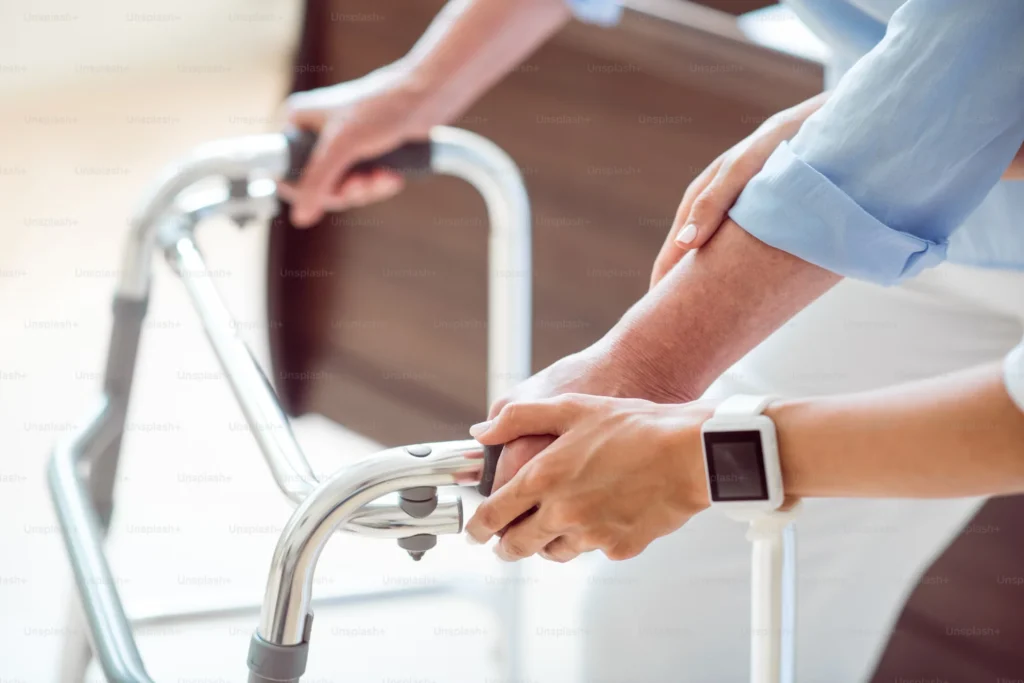Falls are among the greatest risks to senior health and independence. Each year, millions of older adults fall, and not all falls lead to serious injuries; nevertheless, even a minor fall can diminish confidence, mobility, and overall quality of life.
The positive side to this is that falls can be prevented to a great extent. The right fall safety tips can make home a safe place in which the family members and caregivers can help seniors to live independently and with confidence.
The following guide provides useful home safety tips for seniors, effective fall prevention interventions, and what an elderly person needs to do in a situation whereby the elderly loved one is fall-prone.
Why Fall Safety Matters for Seniors
A fall is not just a physical mishap it can affect every area of the life of a senior. In addition to injuries such as hip fracture or head injury, falls may result in anxiety and fear among older adults who become afraid of moving freely. This frequently results in lessening of activity, further weakening the muscles and predisposing one to future risks.
The use of the correct fall prevention strategies and adjustments to their homes enables seniors to live and feel free, safe and secure, and families gain some sense of security about the security of their loved ones.
Essential Fall Safety Tips for Seniors
Fall safety at home is critical, and following these home safety tips for seniors is an essential precautionary measure.
Bring in Cephalic Lighting in the Whole House
Weak light is one of the most observed fall causes. Seniors are never supposed to be in dark areas:
- Use glare-free bulbs that are bright in the hallways, in staircases and entryways.
- Install nightlights in the bedrooms, the bathrooms, and halls.
- Look into the possibilities of installing motion sensor lights in the stairways and bathrooms to increase safety.
Clear Away Ordinary Falls Risk Areas
Cluttered or uneven walkways make the fall more likely:
- Shoes, books, electrical cords should not be in the way.
- Use non-slippery rug backing or clear them up all together.
- Fix an uneven floor and faulty steps as soon as possible.
Add Supporting Features
Home modifications do not necessarily have to be complicated:
- Install handrails on both sides of the staircases with integrity.
- Install place grab bars in toilets and showers.
- Use slip resistant mats in bathroom and kitchen.
- Look into shower chairs, transfer benches, and toilet seats with an increased height so that they are more comfortable.
Keep Essentials Within Easy Reach
Many mishaps occur because the elderly people reach too high, or even, bend too low:
- Keep items that you use on a daily basis on waist level.
- Do not use unsteady stools or seats a safe reach stick is preferable instead.
- Immediately have phones and emergency contacts nearby.
Put Bedrooms and Bathrooms Under Control
- Leave lamps or switches near the bed.
- Layout flashlights and phones in the vicinity in case of an emergency.
- Install non slip mats in the tub, shower and toilet.
- Make bath rooms to be brightly lit at night.
Make Outdoors Safe
Falls Outdoor may be as hazardous:
- Redirect the craking walk ways, uneven steps.
- Make outdoor stairs non slippery.
- Clear porches and pathways of leaves, snow and debris.
- Install fixed or movable handrails or grab bars at entrances.
Fall Prevention Treatments Beyond Home Modification
Although modification of the home alleviates risks, other fall prevention treatments cannot be ignored.
Keep Your Body in the Move
Exercise can make muscles stronger, give better balance and enhance confidence. Good low-impact activities include activities like walking or yoga. A physical therapist can also make custom routines to be followed by seniors who have mobility problems.
Medication Review
Certain drugs result in light-headedness, sleepiness or vertigo. A medical practitioner needs to continuously inspect prescriptions to guarantee that no treatment is elevating chances of falls.
Eye and Hearing Tests
More than a clear vision, one also needs clear hearing to identify the danger. The older adults are encouraged to make annual visits and update glasses or hearing aids.
Use Assisting Devices
- Canes or walkers are additionally beneficial.
- Emergency alert devices (bracelets, necklaces, or smartwatches) will ensure they receive assistance immediately after a fall.
- The smart house can support voice-enabled emergency calls.
What to Do When Elderly Keep Falling
If your loved one continues to fall despite precautions, you may wonder what to do when elderly keep falling. Here are key steps:
- Schedule a medical check-up: Frequent falls may point to health conditions such as balance disorders, joint problems, or medication side effects.
- Request a home safety assessment: Occupational therapists can identify hidden hazards and suggest modifications.
- Consider advanced mobility aids: Walkers, stair lifts, or wheelchair-accessible adjustments may be necessary.
- Install monitoring and emergency systems: Devices that detect falls or allow quick alerts can be life-saving.
When to Seek Professional Help
Sometimes, families may feel overwhelmed managing home safety on their own. In these cases, reaching out to senior care professionals is beneficial. Home care providers, occupational therapists, and local aging councils can recommend fall prevention interventions that fit your loved one’s specific needs.
Final Thoughts
Falls don’t have to be a natural part of aging. With proactive measures ranging from simple home safety tips for seniors to advanced fall prevention interventions families can significantly reduce risks.
By improving lighting, removing tripping hazards, adding grab bars, and encouraging healthy routines, you can protect your loved one’s safety while preserving their independence.
Remember: the best fall safety tips not only prevent accidents but also give seniors the confidence to live freely and securely at home.
Our Skilled Nursing services offer personalized in-home care to help seniors stay safe and supported. Choice Care’s accredited by the Accreditation Commission for Health Care (ACHC) reflects a commitment to quality standards, giving families confidence in the care provided.

